Up the Wild Stikine
Beyond the trafficked sea lanes and cruise ship haunts of Alaska's Inside Passage lies the true Alaska. Still a wild frontier where, if you stroll in the woods, you take a 303 and a cut lunch.
Story and photographs by Roderick Eime
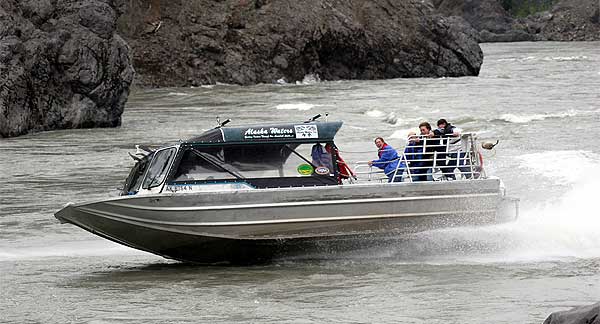
The two mighty
V8 engines erupt into a loud angry growl and the little jet boat begins
to spin wildly in the rough white water. Passengers are screaming, hanging
on for dear life as the scenery of sheer jagged cliffs and enormous boulders
whiz past bare metres away. Then suddenly, we lurch to a violent halt,
followed by a deluge over the stern that completely inundates those clinging
desperately to the railings.
"How's that?!" yells Jim from the shelter of the tiny wheelhouse.
"Fantastic!" comes the exuberant reply from the saturated clients, still shaking the chilly mountain water from their hair and spray jackets. Skipper, Jim Leslie, is not a show-off, but after some gentle coaxing will execute a hair-raising '360' for the sheer thrill of it.
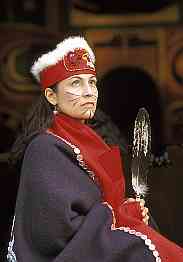 Husband
and wife team, Wilma (pic left) and Jim Leslie, operate Alaska Waters,
a tour company in the little town of Wrangell Alaska, tucked delicately
into a sheltered bay on the island of the same name. For many, the picture
postcard perfect fishing hamlet is another whistle stop on a big ship
Inside Passage cruise, but I'm here for a longer look at the charms of
small town Alaska.
Husband
and wife team, Wilma (pic left) and Jim Leslie, operate Alaska Waters,
a tour company in the little town of Wrangell Alaska, tucked delicately
into a sheltered bay on the island of the same name. For many, the picture
postcard perfect fishing hamlet is another whistle stop on a big ship
Inside Passage cruise, but I'm here for a longer look at the charms of
small town Alaska.
In between visits from the mega-liners, Wrangell reverts to its sleepy village persona, rusty pick-ups amble along the narrow streets, drivers waving nonchalantly to each and every pedestrian and shopkeeper. We sit sipping ice coffee frappes at Jitterbugs, the town's only gourmet coffee house, built in trademark rustic style into the wooden remnants of an old gas station. Tables are arranged outdoors where Chevies and Dodges would have once lined up for a fill.
Apart from the modest fishing fleet, a small squadron of jet boats operate from the village, ferrying tourists and sightseers in various directions to such attractions as the acclaimed Anan Wildlife and Bear Sanctuary, salmon spawning grounds, nearby hunting and fishing lodges and any of the several mighty glaciers spilling great chunks of ancient ice into the pristine rivers.
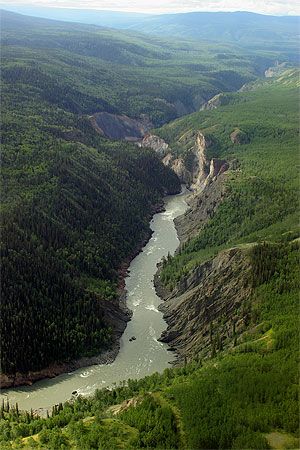 Wilma
and Jim's signature adventure tour is a two-night, white water wilderness
expedition up the magnificent Stikine River into the largely uninhabited
forests of British Columbia. Jim pilots the Chutine Warrior upstream for
six hours [165 miles], through wide shallow flats bordered by sheer majestic
peaks and dense wooded fringes. About halfway, we pull into a small island
for a BBQ lunch. The island, which Jim calls Devil's Elbow, is a handy
refuge. Safely ashore, he can put down his heavy weapon, our last line
of defence against inquisitive Grizzly or black bears, and cook some sausages.
Giant paw prints decorate the narrow silt beach, interspersed with impressions
from moose, bears and even a wolf, attesting to the abundance of big game
roaming the neighbourhood.
Wilma
and Jim's signature adventure tour is a two-night, white water wilderness
expedition up the magnificent Stikine River into the largely uninhabited
forests of British Columbia. Jim pilots the Chutine Warrior upstream for
six hours [165 miles], through wide shallow flats bordered by sheer majestic
peaks and dense wooded fringes. About halfway, we pull into a small island
for a BBQ lunch. The island, which Jim calls Devil's Elbow, is a handy
refuge. Safely ashore, he can put down his heavy weapon, our last line
of defence against inquisitive Grizzly or black bears, and cook some sausages.
Giant paw prints decorate the narrow silt beach, interspersed with impressions
from moose, bears and even a wolf, attesting to the abundance of big game
roaming the neighbourhood.
The drone of the big V8s induces an afternoon nap as we wend our way onward through valleys and ravines en route to our objective of tiny Telegraph Creek. My first overnighter however is a minor detour to the Glenora Guest Ranch owned by pioneering frontierswoman, Nancy Ball, tucked away in the woods near the little Canadian outpost. A petite and sprightly 70-something, Nancy springs off her quad bike and hauls in our boat. "Howdy Jim!" beams Nancy, clearly pleased at the prearranged interruption.
 After
pleasantries and news is exchanged, my kit is loaded aboard the back of
the quad and we're off, 303 at the ready, squelching through the puddles
and mudholes on the track up to her homestead. You won't find her rudimentary
cabins in any Michelin Guide, instead they are basic, tasteful, comfy
and extremely authentic. After a bird-bath in my bedside basin, I remember
my instructions and extinguish the hurricane lamp before drifting off
to a sound and supremely peaceful slumber.
After
pleasantries and news is exchanged, my kit is loaded aboard the back of
the quad and we're off, 303 at the ready, squelching through the puddles
and mudholes on the track up to her homestead. You won't find her rudimentary
cabins in any Michelin Guide, instead they are basic, tasteful, comfy
and extremely authentic. After a bird-bath in my bedside basin, I remember
my instructions and extinguish the hurricane lamp before drifting off
to a sound and supremely peaceful slumber.
I emerge from my cabin to a glorious panorama. Mountains frame the entire scene of forest, river and overgrown cattle yards, where Nancy and her husband once yarded their stock and horses. Still rubbing the sleep from my eyes, Nancy is already darting around the yard like a sparrow, chopping wood and preparing our breakfast of thick rashes of bacon and monster-yolk eggs. A warming beam of sunlight augments the heat from the giant wood stove in the kitchen adjacent the small dining room that's decorated by numerous indoor plants, flowers and quaint handicrafts. A small battery powers radios and kitchen appliances, but the home is otherwise without electricity. "I just can't afford to run the generator any more," confesses Nancy, alluding to the skyrocketing fuel and transport costs.
Her hardy constitution is tinged with a little sadness as it becomes clear the economic and physical strain of remote living is finally catching up with this most remarkable woman. Widowed many years ago, Nancy's son-in-law, Rod, injured in a logging accident and unable to walk, helps as best he can and his wife, unseen throughout my visit, apparently does not share the family passion for the wilderness.
Jim, Wilma and the rest of the crew are waiting for me on the other side of the river as Nancy ferries us across the angry stream. We all bid her a fond farewell and pile into the pick-up for the short trip back into Telegraph Creek. The quirky little town isn't much more than a small store, gas station and a few houses. Populated by about two hundred Tahltan natives, the town's complement was relocated recently to new government-built housing, leaving behind the small wooden village to crumble. Taking a walk around what feels eerily like a western movie set, I peek into abandoned houses, the floors still scattered with the detritus of family life; bottles, magazines, books, old furniture and even a fridge with putrefying food still inside.
I stumble upon the small graveyard, perched imperiously on a cliff overlooking the town and river below. A fresh grave bears witness to the on-going hardship in the tight community. A young man, I later learn, fell from a cliff in undisclosed circumstances, joining so many of his brethren well before their time was due.
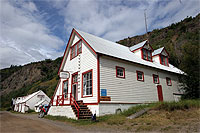 The
tiny, brightly painted inn and general store, Stikine
River Song, almost on the waters edge, is the centre of the
town's modest tourist industry and a beacon of civilisation amid the remains
of the old town. Dan Pakula operates the establishment during the summer
months, offering meals, accommodation and excursions to the trickle of
visitors who come for the sightseeing, fishing, hunting and hiking. The
immediate attraction is the local "grand canyon", the wild,
raging headwaters of the Stikine that gradually dissipates its fury into
the shipping lanes near Wrangell so many miles downstream. They begin
here amongst the sheer, vertical cliffs and gullies that form a tempestuous
watercourse that very effectively deters all but the most determined navigators.
The
tiny, brightly painted inn and general store, Stikine
River Song, almost on the waters edge, is the centre of the
town's modest tourist industry and a beacon of civilisation amid the remains
of the old town. Dan Pakula operates the establishment during the summer
months, offering meals, accommodation and excursions to the trickle of
visitors who come for the sightseeing, fishing, hunting and hiking. The
immediate attraction is the local "grand canyon", the wild,
raging headwaters of the Stikine that gradually dissipates its fury into
the shipping lanes near Wrangell so many miles downstream. They begin
here amongst the sheer, vertical cliffs and gullies that form a tempestuous
watercourse that very effectively deters all but the most determined navigators.
The next event is Jim's tour de force. He and Chutine Warrior, his twin-engined, 600bhp jet boat, are the only combo able to navigate the ill-tempered torrent this far upstream. Life jackets attached, we pile in with some anticipation and the normally reserved Jim is clearly psyching himself for the imminent challenge. Away we roar - there's no holding us back now!
The first sections are relatively easy. Carefully riding the throttles, Jim flicks the craft back and forth; wriggling the stern through narrow passages between boulders the size of caravans. Then it gets hairy. Huge sprays of white water engulf the sharp rocks protruding dangerously from the river bed. The Stikine's constricted flow is channeled through a few perilous openings in this ad-hoc breakwater looming before us. The roar of the water actually drowns out the sixteen straining cylinders as Jim, lips drawn tight and eyes focussed ahead, hurls us all up the ramp of water gushing out between the granite. For a few very long seconds, we're kicked about mercilessly and apprehensive glances are shared across the cabin before we spit ourselves out into the deceptively placid section beyond. Jim eases the two power plants back from their respective red lines and we cruise, almost calmly, around the next bend to find yet another furious cascade awaiting us.
For perhaps an hour we meet this challenge head on before Jim pulls up on a sand bank so we can "relieve the tension"; then it's all aboard for the return journey!
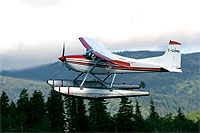 After
lunch, we're down by the lake chatting to Simon the local bush pilot who
runs flight-seeing
trips in his Cessna floatplane up along the same stretch of river
and out over the high plateau, pockmarked by long extinct caldera that
define the lofty reaches above the canyon. The little plane strains before
finally peeling off the mirror still water under the bulk of four burly
blokes. We're soon looking down on what seems like a scale model of the
impressive canyon we were battling within only hours ago. The stream lies
like a discarded silken scarf at the bottom of drunken pipelayer's trench,
twisting and curling around the irregular form of the steep walls.
After
lunch, we're down by the lake chatting to Simon the local bush pilot who
runs flight-seeing
trips in his Cessna floatplane up along the same stretch of river
and out over the high plateau, pockmarked by long extinct caldera that
define the lofty reaches above the canyon. The little plane strains before
finally peeling off the mirror still water under the bulk of four burly
blokes. We're soon looking down on what seems like a scale model of the
impressive canyon we were battling within only hours ago. The stream lies
like a discarded silken scarf at the bottom of drunken pipelayer's trench,
twisting and curling around the irregular form of the steep walls.
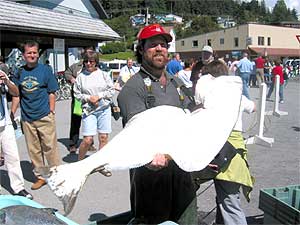 Back
in Wrangell the huge Norwegian Sun is in port, disgorging its
cargo of 2000 sandal-clad, rubber-necked tourists onto the wharf. The
more enterprising community members are out in force spruiking and displaying
their wares, most notably Don the fisherman (left), who cheerfully hoists
an enormous halibut up to his chin repeatedly for photographs. His little
fish and chip van behind him does a roaring trade with the delicious fillets
and keeps him smiling despite the exertion.
Back
in Wrangell the huge Norwegian Sun is in port, disgorging its
cargo of 2000 sandal-clad, rubber-necked tourists onto the wharf. The
more enterprising community members are out in force spruiking and displaying
their wares, most notably Don the fisherman (left), who cheerfully hoists
an enormous halibut up to his chin repeatedly for photographs. His little
fish and chip van behind him does a roaring trade with the delicious fillets
and keeps him smiling despite the exertion.
After the mayhem of the cruise ship invasion subsides, Wilma explains that the town is split on the value of the big liners' visits. Her company and many other local traders rely heavily on the massed traffic injecting valuable dollars into Wrangell's otherwise modest economy. But their indecision and lack of a unified marketing plan has seen several of the big ships bypass the town in favour of nearby Petersburg.
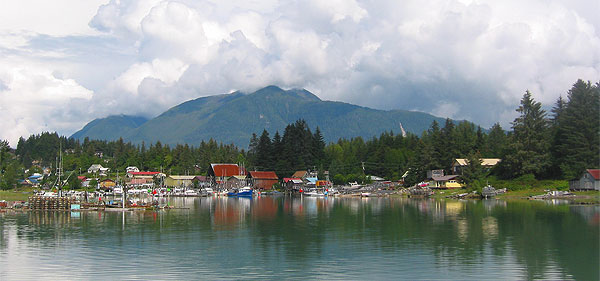
Panorama of Reliance Harbour, Wrangell AK
"Some folk find it hard to realise that the days of logging, mining and major commercial fishing are over," laments Wilma, "the town would shrivel up without tourism."
Certainly, Wrangell is not driven by an all-consuming tourism agenda. Behind the dockside commercial centre lives a quiet village surrounded by some of the most magnificent scenery imaginable. A small wooded hill overlooking the town is being carefully landscaped to include a walking trail and lookout while a delightful nine-hole golf course is also on offer. A compact, yet superbly detailed natural and cultural history museum compliments the gift, souvenir and craft shops and other downtown attractions like Chief Shakes House. Hotel-style accommodation is available at the Stikine Inn, choose homely B&B at Rooney’s Roost or lodge rooms at Bruce Harding’s Old Sourdough Lodge.
For my mind, despite their internal squabbles, Wrangell is an authentic microcosm of small town Alaska. Quirky, quaint, rough-around-the-edges maybe, but with an infinitely wholesome down-to-earth appeal that left this writer feeling a warm satisfaction and a bonding affection with the townsfolk who welcomed me so heartily for those few scant days one July.
Fact File:Where:
Wrangell, Alaska How
to Get There: Alaska
Airlines, twice daily service. Alaska
Marine Contact for all activities: Alaska
Waters Other helpful links: |
Background Image by Runic.com
